Jean Smart Has No Regrets
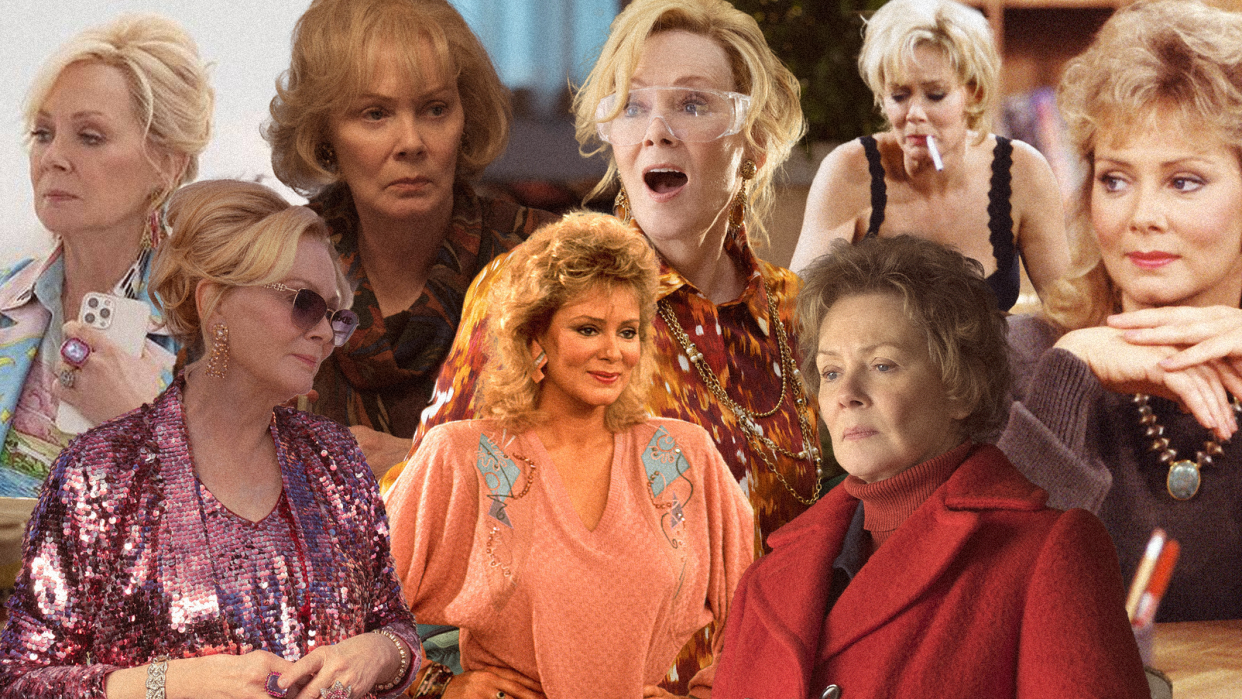
Getty Images; Everett Collection; Max
Jean Smart sits down in front of her computer for this Zoom in full glam—and a bathrobe. It’s the middle of a busy press day for season three of Hacks (streaming now on Max), and since our interview isn’t being recorded for video, she doesn’t think twice. “We were trying to figure out what to do with my hair, and I didn’t have time to redress,” the five-time Emmy award winner says.
When I tell her that showing up in a bathroom makes me like her even more, Smart launches into a recent story worthy of the icon she is:
“So I was at South by Southwest in Austin, Texas, in March to present an award to Hannah [Einbinder, Smart’s costar on Hacks], and what I wore on the plane was pretty casual and sloppy. Of course my luggage got lost. And I since the event was that night, I had to decide either to go shopping or get my hair and makeup done. Which do you think I chose? So I wore the hotel bathrobe on stage and figured I’d make a little bit out of it. Actually, maybe it was Hannah who said that, ‘Wear the bathrobe.' So I did. And I didn’t have to hold my stomach in. It was a nice bathrobe, too.”
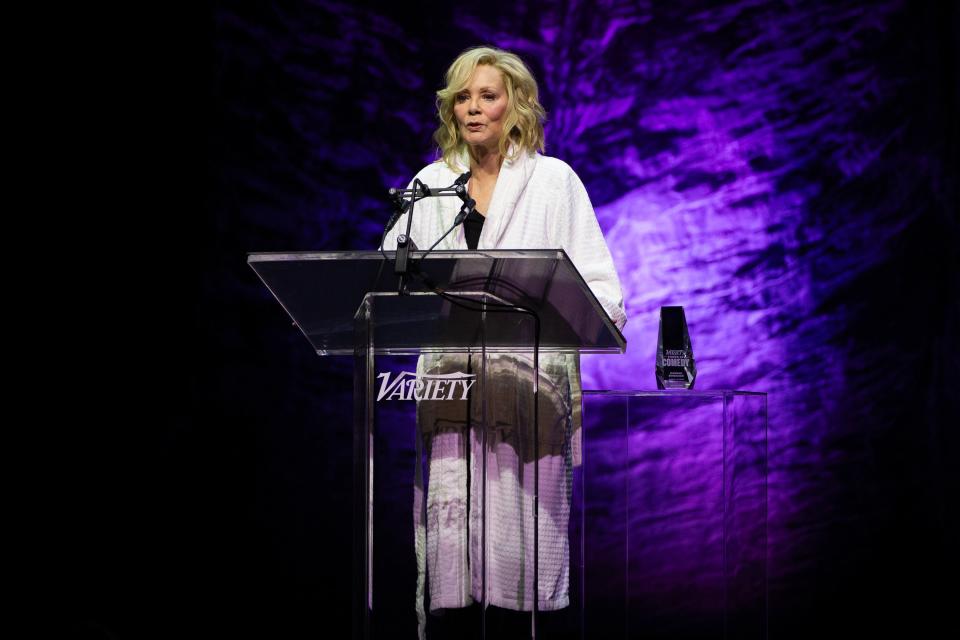
Jean-Smart-Variety Power of Comedy - Show - SXSW 2024 Conference and Festivals.jpg
If any story sums up the 72-year-old stage and screen actor, it’s this one. Disarmingly charming and open, the mother of two best known for her critically acclaimed roles on Designing Women, Frasier, Fargo, Mare of Easttown, 24, Watchmen, and now Hacks, isn’t afraid to lay it all out there. If anything, the last four years (which included the loss of her husband and her own heart surgery) have taught her to embrace the now, because anything less is just a waste of time. “Talk about a wake-up call,” she says. “You realize how short life really is.”
For Smart, that doesn’t just mean having the time of her life on Hacks, but encompasses unlearning so many of the lessons engrained in her growing up. From people-pleasing (“Everybody wants to be liked, especially actors. That’s why we became actors,” she says) and letting go of regret, she’s more at peace than ever before.
And now, for Glamour’s Icon Only feature, she’s opening up about why she wishes she’d been more appreciative of her ensemble hit sitcom, Designing Women, welcoming a second child in her late 50s, and making the first move with the man who would become her husband.
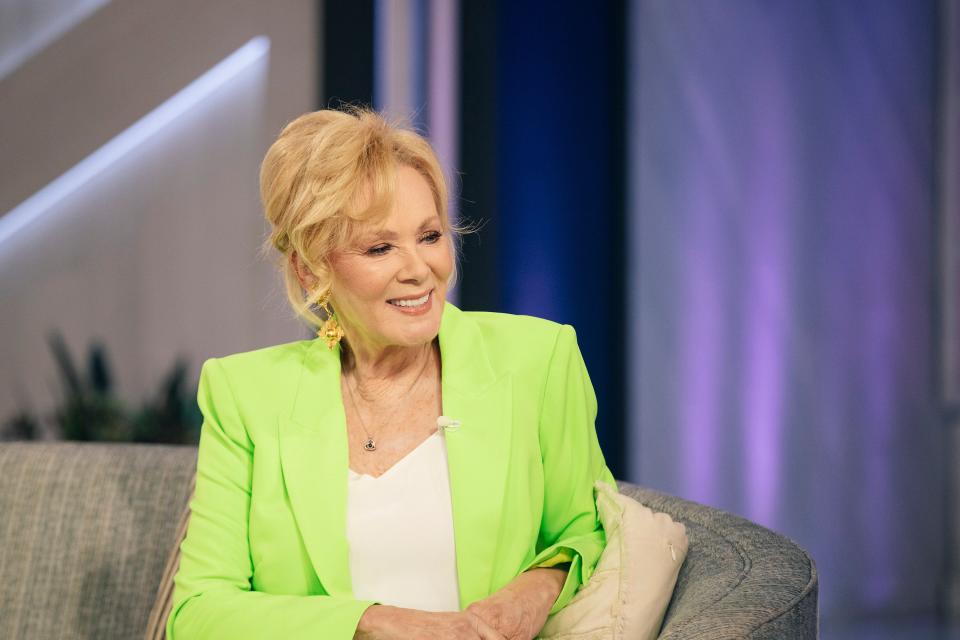
Glamour: How do you feel about being called an icon? I noticed you winced when I first mentioned it.
Jean Smart: It’s still kind of weird, but it also makes me feel like I’m up on Mount Rushmore. I feel like I’m a thousand years old. But no, I know it’s a compliment, so I will take it as a compliment.
Yes, please do! Is there a career achievement that’s a little bit higher on that mountain for you than others? What are you most proud of?
Definitely Hacks. And also when I was nominated for a Tony on Broadway. I did The Man Who Came to Dinner with Nathan Lane. That was a huge thrill. I think all actors fantasize about winning a Tony. And there are other shows that are just huge standouts for me, like Fargo and Watchmen.
Fargo was one of my all-time favorite jobs. I’d take a crack again at playing Floyd. And I was concerned at first because the opening scene of our season was so violent. But then as we worked through it, I was reminded of the tone of the original film, which can be very dark, but there’s this humor, underlying humor to the almost absurdity of the violence sometimes.
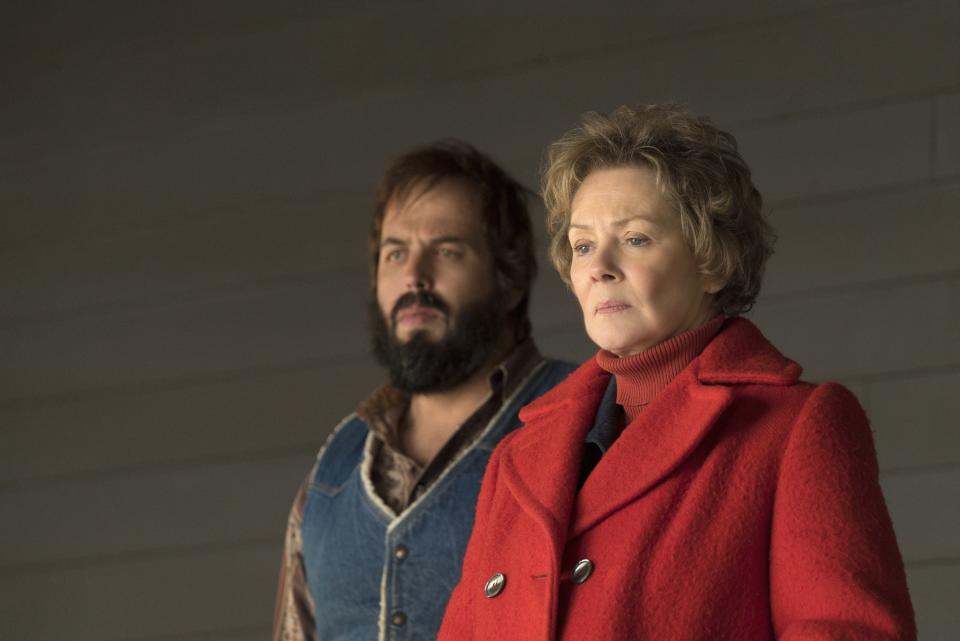
FARGO, (from left): Angus Sampson, Jean Smart, 'The Myth of Sisyphus', (Season 2, ep. 203, aired
Aside from Fargo, is there a role that you wish you could go back and play again because it was such a rewarding experience?
Mare of Easttown and Watchmen. I loved playing those characters. They were so different and fun. And I know they’ve been trying to figure out a way to do some more Mare of Easttown, but it’s gotten too complicated, so it probably won’t happen.
You’re the most awarded performer in the history of the Critics’ Choice Television Awards and have five Emmys, and probably counting...
And I didn’t sleep with that many of them. Honestly, I didn’t.
You won your first Emmy for your guest appearance on Frasier. What did that do for your confidence?
It was one of my favorite jobs, and just a blast playing Lana [Gardner, an outspoken former classmate of Frasier Crane]. It was also very fun and exciting for my parents, so it was nice to be able to share that with them. I wish they could have seen Hacks. That makes me sad. They didn’t get to, and I think my mother in particular would’ve really, really enjoyed it. But yeah, it was just exciting and flattering and to get acknowledged by your profession. It’s a wonderful thing.
One of your most iconic roles is Charlene from Designing Women. The CBS sitcom has a new life thanks to Hulu, but you originally cried when you were signing the contract because you thought it would tie you down. What did that experience teach you?
It’s sort of funny that you asked that because I was talking to my youngest child about this last night. He recently got a haircut. It was very extreme and he was so horrified that he stayed in his room with a beanie on for almost two days. And now he kind of likes it. A couple of days after that I said, “You know what? One of the hardest lessons in life to learn is when something doesn’t turn out the way you want and you’re so disappointed or annoyed or angry, and then later it turns out it was actually a good thing.” That’s such an important thing to remember because we don’t always really know what we want, what we need. And sometimes there’s other reasons why other things happen.
I was telling him about the stupid tile in my new shower, because I couldn’t get the tile that I wanted. It was out of stock. It would’ve taken months to get it ordered. I finally settled for something that was similar, but it wasn’t the vision I’d had in my head. And now I just love it. It’s the little things…obviously much more important things than haircuts and shower tile. You get a picture in your head. It’s like making a list of things you want in a partner and you end up marrying somebody who doesn’t even match that list. It’s chemistry.
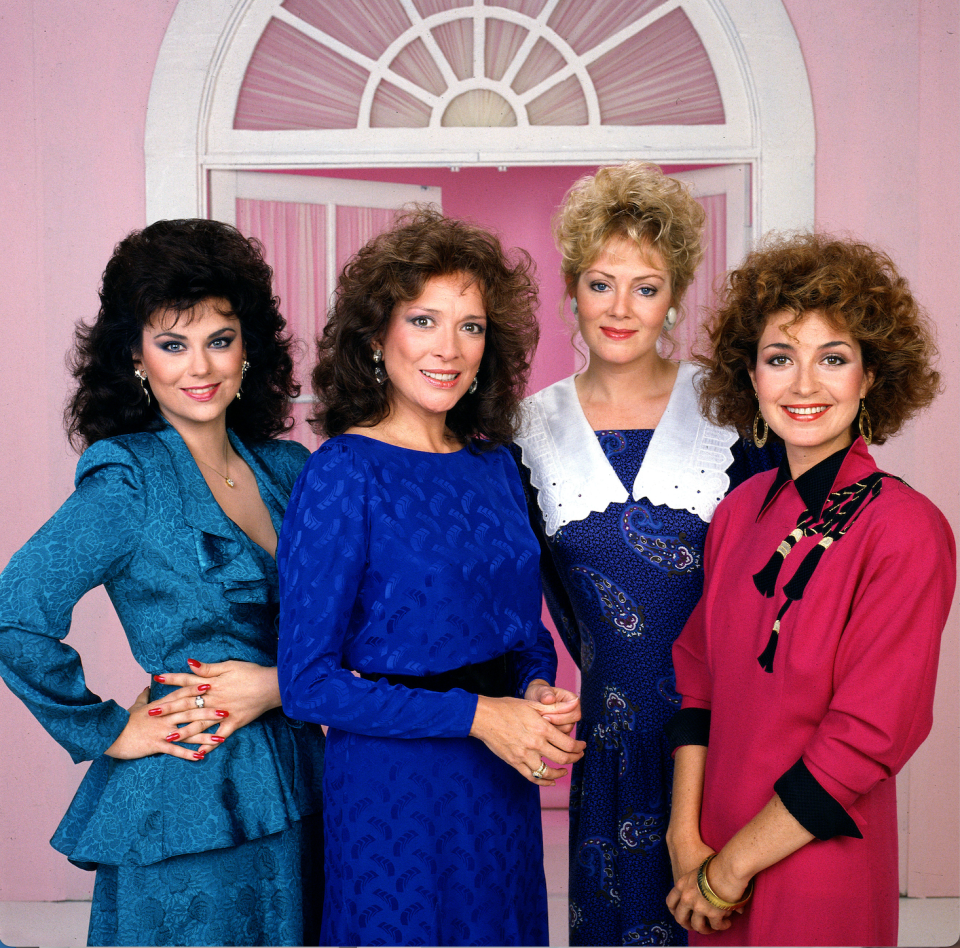
designing-women-delta-burke-dixie-carter-jean-smart-annie-potts.jpg
Well, speaking of partners, you met your late husband, Richard Gilliland, while working on Designing Women. As the story goes, you asked him into your dressing room for help with a crossword puzzle. What happened next? Did you complete the crossword puzzle?
I know. I told him later, “I was so forward with you. That is not me at all.” But he was making me laugh all the time and saying really inappropriate things that probably would be a #MeToo moment now. Oh God, I would just laugh. But I have to say, there is one thing about meeting somebody at work…is that you’re not on a date and all the pressure [that comes with that]. You have to be together and you get to know each other a little bit. So we talked a lot that week, and he invited me to see a play he was in. I went 17 times and we started talking on the phone every night…an hour and a half, two hours, each time. We lived about 15 minutes apart. It was just one of those instant kind of bonds. It was kind of amazing.
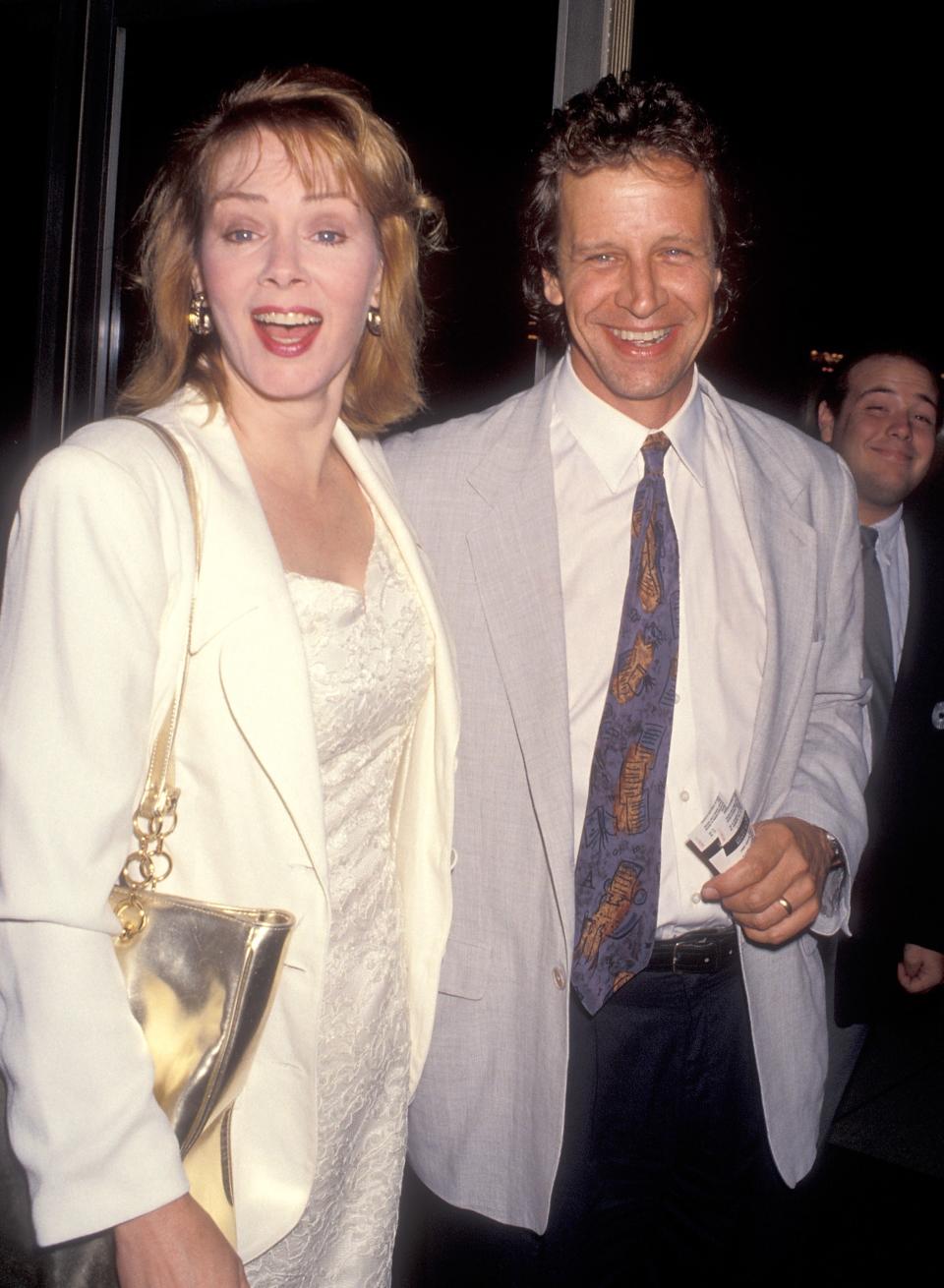
Jean-Smart-Robert-Gilliland.jpg
And then you got married at costar Dixie Carter’s house.
Oh my gosh, yes. Her beautiful rose garden. Yeah. That was special.
Do you ever rewatch the episodes when Richard first guest-starred on the show?
I have run across some episodes online, and it’s really fun to watch. And I have to be really, really honest. I don’t think I appreciated the show completely when I was doing it. In retrospect, I really realized what a great show—what a unique show really—that it was, especially for back then. And how amazing [creator] Linda Bloodworth-Thomason is and was.
You left Designing Women after five seasons. Is there a part of you that wishes you would’ve stayed until the end?
No. It was good that I left at the end of my contract. I told Linda what I wish they had done when Delta and I left was instead of replacing our characters with very similar characters, that…if I had been producing it, I would’ve replaced a Delta with a very overtly flamboyant gay man. And he could have had a very similar dynamic with Meshach Taylor’s character [Anthony Bouvier], which would’ve been really funny. And I would’ve had Alice Ghostley [who played Bernice Clifton] take over my job as the firm’s secretary. I see her answering the phones. I mean, my God.
I also got married during the show. I had my first child during the show. My life was changing dramatically. In fact, the night I found out I was pregnant, I was sitting in my dressing room in Charlene’s wedding dress, having a cigarette, and I’m looking in the mirror going, well, number one, they married her off just in time because I’m pregnant, and she’s supposed to be the good girl on the show. And number two, no more cigarettes. Richard was worried partly because of my diabetes and everything, and it hadn’t been planned. We were both a little freaked out.
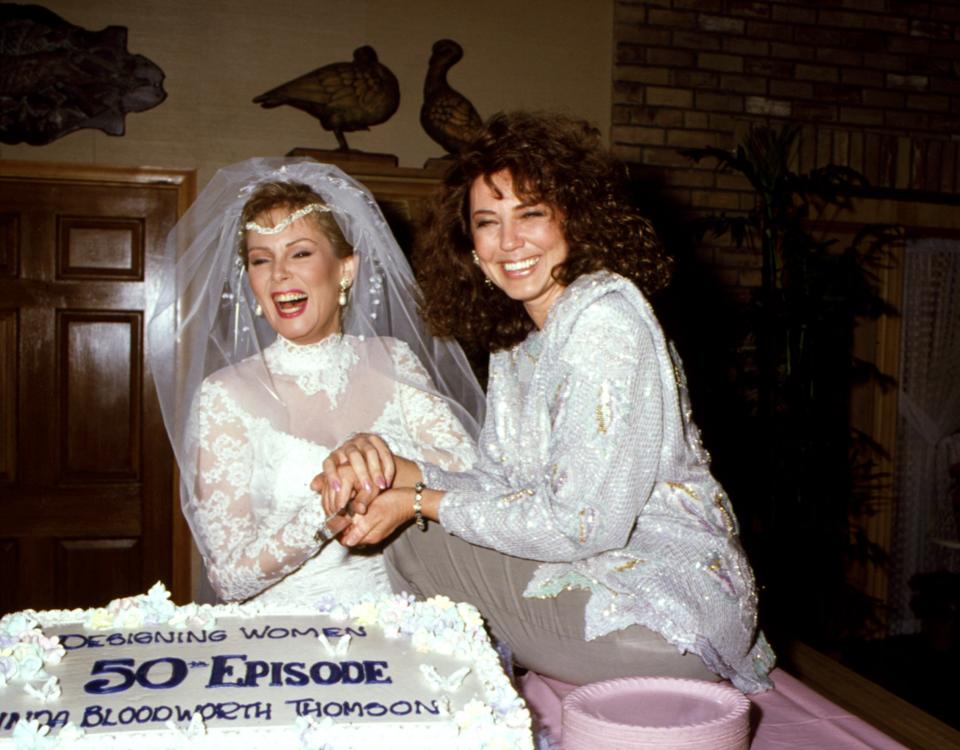
DESIGNING WOMEN, Jean Smart, Linda Bloodworth Thomason, (50th Episode Party, Season 3), 1986-93, © C
You then became a mom for the second time in your late 50s, when you and Richard adopted a baby from China. Tell us about that.
Well, I did have to twist my husband’s arm a bit, and I started twisting it when I was closer to my early 50s when I felt like my life was peaking and everything was just the best. And then my father, unfortunately, was diagnosed with Alzheimer’s, and we kind of put [welcoming another baby into the family] on the back burner. Plus, Richard kept saying, “Oh, I think we’re too old.” And I said, “Well, yeah, maybe when we first started talking about it, we weren’t.” But then I just cried one day and he finally went, “Okay, okay. Just don’t cry.” So I was totally ready. And very excited. But I do think there are serious considerations to make. I mean, I’m thrilled that we did. It was just the best. And my youngest is just an amazing person, but certainly there are considerations. I mean, he lost his dad when he was 12. How do you take away that pain? That’s a trauma that people need to think of and be mindful of. Certainly we had no idea Richard had any kind of health issues.
But the second this baby was handed to us, we were just so besotted. It was the best. But it took years for the process and mountains of paperwork.
Forrest is 15 now. Has he made you feel younger at heart?
Oh, I think so. Kids keep you young, absolutely. But then you end up embarrassing them because you do things because you’re feeling young and they’re going, “Don’t do that. You’re old. Stop it. It’s embarrassing.”
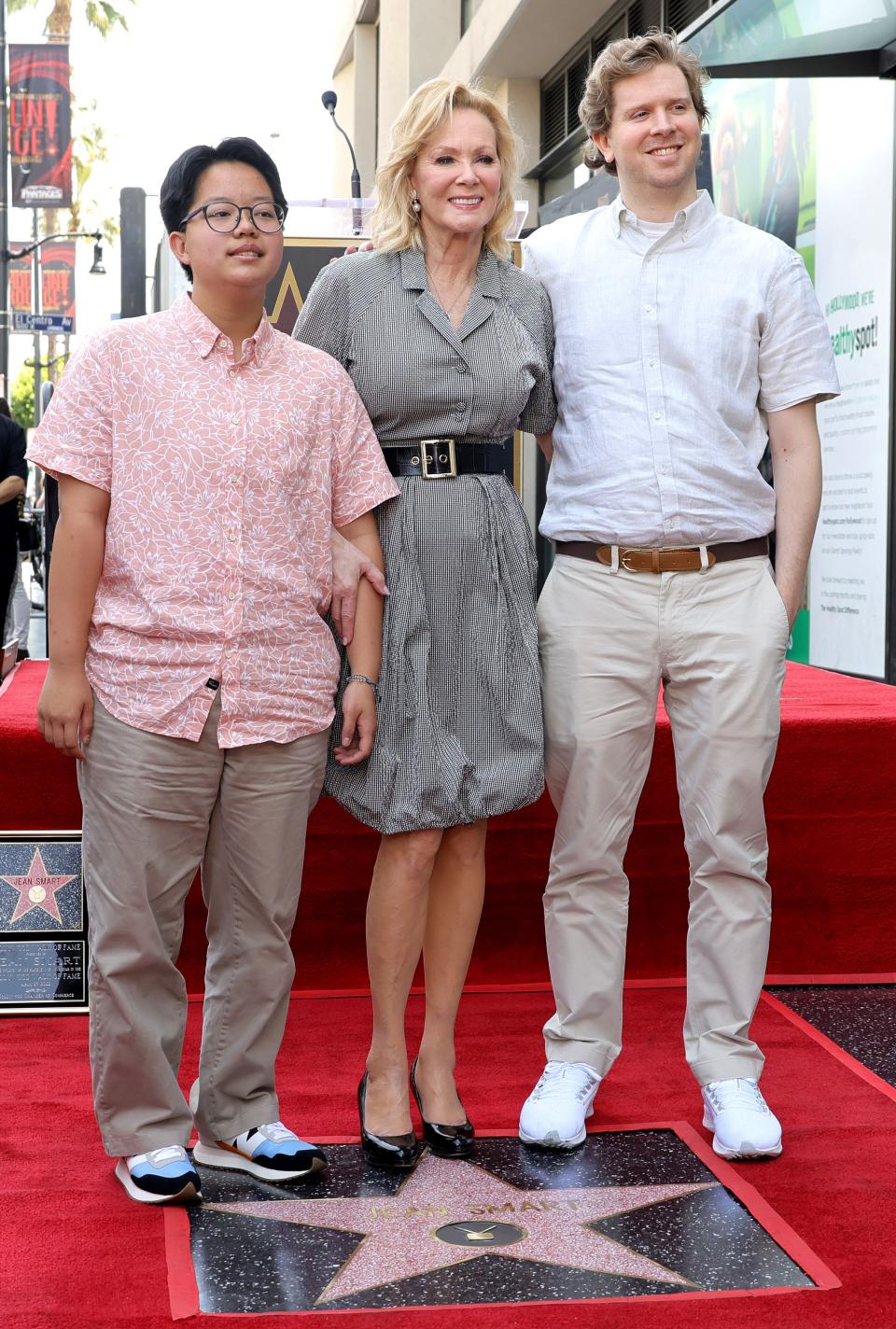
Jean Smart-Connor-Forrest-sons-hollywood-walk-of-fame.jpg
What are the lessons that you’re unlearning at this point in life?
The first thing is about people-pleasing. That can be a very nice quality. And I try to be really considerate and generous, but you’ve got to learn to say no sometimes. And I’m not really good at that. I’m learning that because my kids always say, “Why did you say yes to that? You said you were stressed or you said you were tired.” It’s like, “Yeah, but I should,” and that’s a hard one because you want to be liked. Everybody wants to be liked, especially actors. That’s why we became actors. “Love me. I didn’t get enough attention as a child.” But yeah, learning to say no, but nicely. You can always say no nicely.
Was there ever a role that you turned down that took a long time to get over?
Yes. When Faith Prince was doing The King and I on Broadway, I was doing an off-Broadway play at the time, and she was getting ready to leave the show. The director talked to me about taking over the role. This was like a childhood fantasy. My father played that album ad nauseam. I used to dance around the living room to that music. And yet I said no. My reasoning was that I was just mentally prepared to go back home to California because the family had already been uprooted to New York for the summer and my kid had to go back to school. But I think it was also fear, and that makes me feel sad.
The other role I turned down…I auditioned for Stephen Sondheim for Follies in New York. And he offered it to me and I said no.
How come?
I wish I’d known. I think, again, it was fear. It’s not fear of being on Broadway. I am actually working on a show that we’re going to do next summer in New York, but I guess it was the singing too. I used to be a good singer, but yeah, I don’t know. Although with Follies, I have to say, if I had been crazy about the role, I would’ve done it. I think it was a case of, I’d been taking some voice lessons and I wanted to prove to myself that I could do it. I was really proud of my audition. And then he offered it to me, but I thought, I don’t really want to play this part. If I’d really wanted to play the part, I would’ve done it. I would’ve been terrified, but I would’ve done it.
Have you forgiven yourself?
That’s another big life lesson you got to learn. Even if it’s not true, you have to just tell yourself, “You know what? I made those decisions at that time for reasons and you let it go.” Because to me, regret is the most damaging emotion of all. Guilt’s right after that. But regret, to me, is the worst.
Aside from the pandemic and the strikes, you’ve gone through so much the last few years with your husband’s passing and your health. How have you changed, and has that influenced the kind of stories you want to tell going forward?
I feel like I’m more fearful in some ways, which is not a good way to live. And I know some of that will go away. I know some of that is part of the healing process in both of those situations. So I’m trying to not worry about that too much. But talk about a wake-up call, both of those things, where you realize how short life really is.
As we saw in the first episode of Hacks this season, eat the coconut cake. Or at least take a bite. Just eat the cake. And wear a robe.
Exactly! And I am.
This interview has been edited for length and clarity.
Jessica Radloff is the Glamour senior West Coast editor and author of the NYT best-selling book The Big Bang Theory: The Definitive, Inside Story of the Epic Hit Series.
Originally Appeared on Glamour


